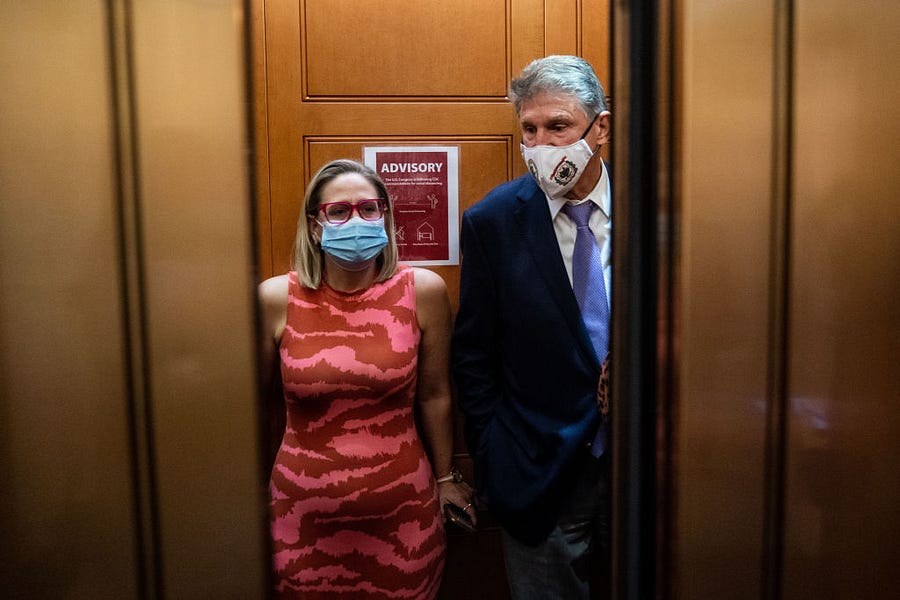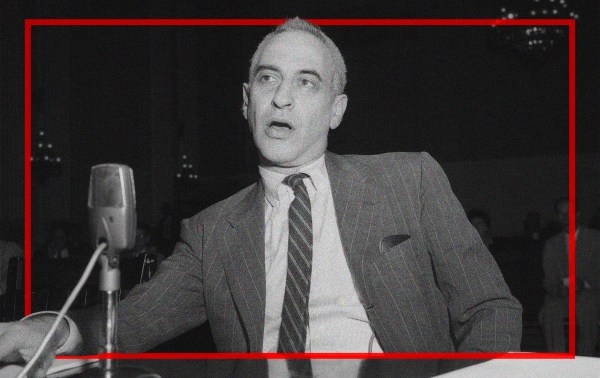Sen. Kyrsten Sinema is driving her party absolutely bonkers. For publicly joining her fellow Democrat, Joe Manchin of West Virginia, in opposing a $3.5 trillion social-welfare package passionately desired by the party’s progressives, the first-term senator from Arizona has become an object of intense loathing on the left.
Mother Jones wants you to know that some people who also usually donate money to Republicans have given her campaign contributions. A home-state columnist thinks she’s been paid off with campaign contributions by pharmaceutical companies to oppose the package. New York Magazine’s Jonathan Chait seems to agree, observing that because she opposes the spending plan backed by Sen. Bernie Sanders, “[h]er positions line up closely with what wealthy lobbyists desire.” Dana Milbank of the Washington Post likened her to a disturbed man detained after a standoff with police near the Capitol. Michelle Cottle of the New York Times says Sinema should probably leave the party altogether.
Activists hassle her on airplanes, they harass and film her in the ladies room, and they even followed her to the Boston Marathon.
While Manchin certainly gets plenty of blowback for his refusals, there seems to be a more intense—more vicious—quality to the attacks on Sinema. It may have something to do with her being a woman, and an openly bisexual woman at that. Expectations among activists for a young female senator are probably different from those for an older male. Some of it probably has to do with where she’s from. President Biden ran 20 points better in Arizona than he did in West Virginia, and Arizona is seen as the new frontier for Democrats. That all no doubt makes her more of a traitor in the eyes of intense partisans than Manchin could ever be. But the biggest difference is probably that they figure it might work on her.
There is no progressive base in West Virginia. There isn’t even much of a Democratic Party to speak of anymore. A state that went for Michael Dukakis in 1988 couldn’t come up with 30 percent of its vote for Biden last year. Manchin is the only Democrat in statewide office, and will be for the foreseeable future. The more the left attacks Manchin, the stronger he becomes in his home state. If he wants to run for reelection in 2024—or perhaps return home for another term as governor—there’s little better he could have as a credential than to be the guy who ruined the hopes of the progressive left.
It is not so for Sinema. Democrats could easily deny her reelection in 2024. She won her seat in 2018 by about two points—and that was in a good year for Democrats and against a weak Republican candidate. Even a little dip in Democratic enthusiasm could have done her in. Data For Progress, sort of the Rasmussen Reports of the left, has declared Sinema in big trouble—“poised to lose” her 2024 primary. A methodologically dubious survey shows her losing by more than 2-to-1 to Rep. Ruben Gallego, a progressive heartthrob who represents Arizona’s bluest district. That’s probably off base, but there’s no doubt that she’s got trouble on the horizon. The probability of actually punishing Sinema for her apostasies makes pursuing such punishments more appealing.
But there’s also lots of opportunity for professional progressives. The Bernie-ite wing of the Democratic Party is prepared to make a whole industry out of Sinema opposition. Unlike similar efforts—think of former Rep. Beto O’Rourke—the anti-Sinema effort represents two races to run. First, they can raise and spend scads of money on behalf of Gallego in the primary and then again as he runs (probably unsuccessfully) in the general. No mainstream Democratic political professional would want to have to run a hard-left nominee like Gallego in a red-tinted swing state in a presidential year instead of center-seeking Sinema. But it’s easy to see Gallego raising and wasting more than the $80 million O’Rourke poured out of his boot into the parched earth.
It wouldn’t be fair to equate money given by the employees of big corporations with the funds solicited from rage-clicking, Chris Hayes-watching activists, though. Influence-seeking donors will only give to candidates who might win. Rage-obsessed partisans, meanwhile, don’t really care. Jamie Harrison, the Democratic challenger to Lindsey Graham who raised more than anyone ever for a Senate run, spent it all—making many consultants rich in the process—and lost by 10 points. Gallego could certainly deliver such results at the bank and the ballot box in 2024.
While the engorged progressive base is thinking about defenestrating Sinema for fun and profit, there is an actual Senate race taking place in Arizona this year. Sen. Mark Kelly is up for reelection in 2022. He and Sinema are united by the fact that they both got to the Senate by beating Martha McSally. But one suspects the unity probably runs deeper than that, even if he is quieter than his colleague.
So far, progressive activists seem content to leave the obstinately opaque Kelly alone. And that’s even as he’s built a very impressive war chest with money from some of the same sources that are now used to call Sinema’s loyalties into doubt. But Kelly has gotten better at hiding than an elf owl in the arms of a saguaro cactus. It’s a good strategy, too. Republicans have only just begun the work of damaging one another in the primary. Tech bro Peter Theil is gushing money into the GOP primary on behalf of one of his lieutenants, Blake Masters, while frontrunner Attorney General Mark Brnovich is engaging in a very weird flex. With no real primary challenge, Kelly is free to save his money and wait for the general.
But Sinema is part of Kelly’s strategy, too. And he’s not the only one. Kelly is just one of many Democratic senators who are happy to stand silent while Sinema and Manchin take the heat for opposing what will be a massively unpopular spending measure. The refusal of his home-state colleague and Manchin obviates any further discussion on the subject. Without all 50 Senate Democrats, there’s no need for Kelly to even take a vote on the $3.5 trillion package. There’s no question that Kelly would be better off not having to vote on the Sanders-backed bill. Sinema may make that possible.







Please note that we at The Dispatch hold ourselves, our work, and our commenters to a higher standard than other places on the internet. We welcome comments that foster genuine debate or discussion—including comments critical of us or our work—but responses that include ad hominem attacks on fellow Dispatch members or are intended to stoke fear and anger may be moderated.
With your membership, you only have the ability to comment on The Morning Dispatch articles. Consider upgrading to join the conversation everywhere.